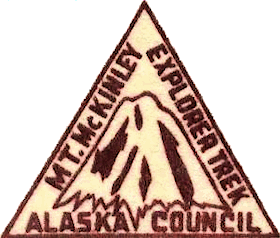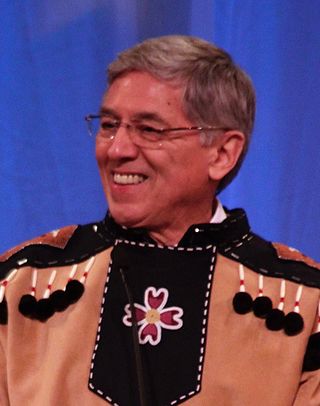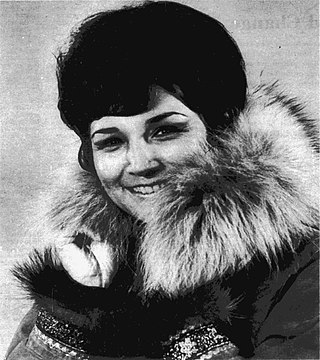
Alaska is a non-contiguous U.S. state on the northwest extremity of North America. It borders the Canadian province of British Columbia and the Yukon territory to the east; it shares a western maritime border in the Bering Strait with Russia's Chukotka Autonomous Okrug. The Chukchi and Beaufort Seas of the Arctic Ocean lie to the north and the Pacific Ocean lies to the south. Technically a semi-exclave of the U.S., it is the largest exclave in the world.

Southeast Alaska, often abbreviated to southeast or southeastern, and sometimes called the Alaska(n) panhandle, is the southeastern portion of the U.S. state of Alaska, bordered to the east and north by the northern half of the Canadian province of British Columbia. The majority of southeast Alaska is situated in Tlingit Aaní, much of which is part of the Tongass National Forest, the United States' largest national forest. In many places, the international border runs along the crest of the Boundary Ranges of the Coast Mountains. The region is noted for its scenery and mild, rainy climate.

The City and Borough of Juneau, more commonly known simply as Juneau, is the capital city of the U.S. state of Alaska, located in the Gastineau Channel and the Alaskan panhandle. Juneau was named the capital of Alaska in 1906, when the government of what was then the District of Alaska was moved from Sitka as dictated by the U.S. Congress in 1900. On July 1, 1970, the City of Juneau merged with the City of Douglas and the surrounding Greater Juneau Borough to form the current consolidated city-borough, which ranks as the second-largest municipality in the United States by area and is larger than both Rhode Island and Delaware.

Scouting in Alaska has a long history, from the 1920s to the present day, serving thousands of youth in programs that suit the environment in which they live. Alaska shares a communal Scout history, only being broken into smaller councils in the 1960s.

The Alaska Time Zone observes standard time by subtracting nine hours from Coordinated Universal Time (UTC−09:00). During daylight saving time its time offset is eight hours (UTC−08:00). The clock time in this zone is based on mean solar time at the 135th meridian west of the Greenwich Observatory.
The University of Alaska Southeast is a public university with its main campus in Juneau, Alaska and extended campuses in Sitka and Ketchikan. It is part of the University of Alaska System and was established on July 1, 1987, with the restructuring and consolidation of the former University of Alaska Juneau, Ketchikan Community College, and Islands Community College (Sitka). The university is accredited by the Northwest Commission on Colleges and Universities.

The Diocese of Fairbanks is a Latin Church ecclesiastical territory, or diocese, of the Catholic Church in the northern part of the state of Alaska in the United States.

The history of Alaska dates back to the Upper Paleolithic period, when foraging groups crossed the Bering land bridge into what is now western Alaska. At the time of European contact by the Russian explorers, the area was populated by Alaska Native groups. The name "Alaska" derives from the Aleut word Alaxsxaq, meaning "mainland".

Elizabeth Peratrovich was an American civil rights activist, Grand President of the Alaska Native Sisterhood, and a Tlingit who worked for equality on behalf of Alaska Natives. In the 1940s, her advocacy was credited as being instrumental in the passing of Alaska's Anti-Discrimination Act of 1945, the first state or territorial anti-discrimination law enacted in the United States.

Byron Ivar Mallott was an American politician, elder, tribal activist, and business executive from the state of Alaska. Mallott was an Alaska Native leader of Tlingit heritage and the leader of the Kwaash Ké Kwaan clan. He was the 12th lieutenant governor of Alaska from December 2014 until his resignation on October 16, 2018. He also previously served as the mayor of Yakutat, the mayor of Juneau, the president of the Alaska Federation of Natives and the executive director of the Alaska Permanent Fund.

The following outline is provided as an overview of and topical guide to the U.S. state of Alaska:
Alaska is officially covered by two time zones - the Alaska Time Zone and the Hawaii-Aleutian Time Zone. The Hawaii-Aleutian Time Zone is used for the Aleutian Islands west of 169°30′W, and the rest of the state uses the Alaska Time Zone. The entirety of Alaska observes daylight saving time.
Lora H. Reinbold is an American politician who is a member of the Alaska Senate. She was a member of the Alaska House from 2013 to 2019, representing District 26. In 2018, Reinbold was elected to the Alaska State Senate representing the G district. She served in the State Senate from 2019 until retiring in 2023. From 2015 to the end of her tenure, Reinbold was the only member of the Alaska State Legislature unaffiliated with a caucus organization, as she was ejected from the Republican-led majority caucus in March 2015.
Elaine Elizabeth Abraham was a Yakutat Tlingit Tribe elder and registered nurse who contributed to improving health care delivery in rural Alaska. Later active professionally in the field of education, she assisted with the creation of the Alaska Native Language Center, and, as a statewide administrator at the University of Alaska, in 1976, led the establishment of community colleges in underserved parts of the state.

Alice E. Brown was a member of the Kenaitze Tribe of Dena'ina peoples, who worked for Native Alaskan rights. She was involved in defending the rights of Alaska Natives and disenfranchised groups in Alaska. She was the only woman to serve on the original Alaska Federation of Natives' Board of Directors and pressed for passage of the Alaska Native Claims Settlement Act. Brown was posthumously inducted into the Alaska Women's Hall of Fame in 2010.

Mary Jane Fate was a Koyukon Athabascan activist. She was a founding member of the Fairbanks Native Association and the Institute of Alaska Native Arts and worked as a lobbyist for the Alaska Native Claims Settlement Act. She co-founded the Tundra Times newspaper and served as a director of the corporate board for Alaska Airlines for over two decades. She served as co-chair of the Alaska Federation of Natives between 1988 and 1989, the first woman to serve in the capacity, and was the third president and a founding member of the North American Indian Women's Association. Fate has served on various commissions and national studies of issues which affect indigenous people. She was the project manager of a study of women and disability, served as the only indigenous member of the U.S. Arctic Research Commission and was a member of U.S. Census Advisory Committee on indigenous populations. She has received numerous honors and awards for her activism on behalf of Native Americans and was inducted into the Alaska Women's Hall of Fame in 2014.
The history of the Jews in Alaska began before the Alaska Purchase in 1867. Jews from Imperial Russia lived there periodically as fur traders, and a Jewish community has existed since the 1880s. The Klondike and Nome gold rushes attracted Jews to Alaska to seek their fortunes as miners and businessmen and resulted in the first organized Jewish communities. In the Nazi period, Jewish refugee resettlement in Alaska was seriously considered by the government, but after facing backlash, never came to be. Alaskan Jews played a significant role in business and politics before and after statehood, and have included mayors, judges, senators and governors. Today, there are Jews living in every urban area of the state.

Laura Mae Bergt was an Iñupiaq athlete, model, politician, and activist for the Iñupiat and other Indigenous Alaskans. Born in the Northwest Arctic Borough of Alaska to bi-racial parents, she grew up in Nome and Kotzebue before attending high school in Sitka. Involved in the Native Olympic movement, she was both a nine-times winner of the Arctic Circle blanket toss event and served as chair of the World Eskimo Indian Olympics in 1966. She worked as a promoter for the new state of Alaska attending trade shows and making marketing appearances as a spokeswoman and guest on radio and television programs. From the 1960s, she worked in various policy positions at the tribal, local, state, and national level to address issues like disability, education, employment opportunities, housing, and poverty, and promoting the rights of Indigenous people.












